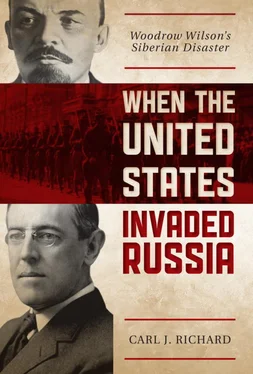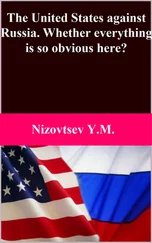David W. McFadden, Alternative Paths: Soviets and Americans, 1917–1920 (Oxford: Oxford University Press, 1993), 191.
David Lloyd George, Memoirs of the Peace Conference (New Haven, Conn.: Yale University Press, 1939), Secretary’s Notes of Inter-Allied Conference, vol. 1, 211–12, 216.
C. K. Cumming and Walter W. Pettit, eds., Russian-American Relations, March 1917–March 1920: Documents and Papers (New York: Harcourt, Brace, 1920; reprint, Westport, Conn.: Hyperion, 1977), 273.
Ibid., 280–81; U.S. Department of State, Papers Relating to the Foreign Relations of the United States, Russia, 1919 (Washington, D.C.: Government Printing Office, 1937; reprint, New York: Kraus, 1969), Ira Nelson Morris to Frank L. Polk, December 24, 1918, 1; Colville Barclay to Frank L. Polk, January 3, 1919, 2–3; Arthur S. Link, ed., The Papers of Woodrow Wilson (Princeton, N.J.: Princeton University Press, 1966–1994), Maxim Litvinov to Wilson, December 24, 1918, vol. 53, 492–94.
U.S. Department of State, Foreign Relations, Russia, 1919 , Notes of a Conversation Held in M. Pichon’s Room, January 12, 5; Colville Barclay to Frank L. Polk, January 13, 7.
Ibid., Notes of a Conversation Held in M. Pichon’s Room, January 16, 11–14.
Ibid., Leland Harrison to Joseph C. Grew, January 9, 4; Osborne to Commission to Negotiate Peace, January 18, 15–17.
Ibid., Notes of a Conversation Held in M. Pichon’s Room, January 21, 19–25.
Ibid., Notes of a Conversation Held in M. Pichon’s Room, January 22, 30–31; Lloyd George, Memoirs of the Peace Conference , vol. 1, 232; Peter Fleming, The Fate of Admiral Kolchak (London: Rupert Hart-Davis, 1963), 125.
U.S. Department of State, Foreign Relations, Russia, 1919 , Commission to Negotiate Peace to Frank L. Polk, January 27, 35.
Ibid., DeWitt C. Poole to Frank L. Polk, February 4, 42–43; Commission to Negotiate Peace to Frank L. Polk, February 10, 51.
Ibid., Georgi V. Chicherin to the Allies, February 4, 40–42.
Ibid., Russian Embassy in France to Secretariat-General of Paris Peace Conference, February 12, 54; George F. Kennan, Russia and the West under Lenin and Stalin (Boston: Little, Brown, 1960), 127; Cumming and Pettit, eds., Russian-American Relations , 303–6.
U.S. Department of State, Foreign Relations, Russia, 1919 , Frank L. Polk to Ernest L. Harris, February 15, 68; Link, Papers of Woodrow Wilson , A News Report of a Press Conference, February 14, 1919, vol. 55, 161; Remarks to the Democratic National Committee, February 28, 1919, vol. 55, 320. For Kolchak’s promise to pay the Russian debt in December 1918, see N. G. O. Pereira, White Siberia: The Politics of Civil War (Montreal: McGill-Queen’s University Press, 1996), 112.
Lloyd George, Memoirs of the Peace Conference , vol. 1, 214–15, 242; McFadden, Alternative Paths , 204–5.
Link, Papers of Woodrow Wilson , Colonel Edward House to Wilson, February 19, 1919, vol. 55, 213; Ilya Somin, Stillborn Crusade: The Tragic Failure of Western Intervention in the Russian Civil War, 1918–1920 (New Brunswick, N.J.: Transaction, 1996), 51.
U.S. Department of State, Foreign Relations, Russia, 1919 , Minutes of the 14th Session of the Supreme War Council, February 14, 56–59.
Ibid., Notes of a Conversation Held in M. Pichon’s Room, February 15, 60–67.
Ibid., Commission to Negotiate Peace to Frank L. Polk, February 17, 68–69; Woodrow Wilson to Commission to Negotiate Peace, February 19, 71–72; David R. Francis, Russia from the American Embassy, April 1916–November 1918 (New York: Scribner’s Sons, 1921), 309–10; Link, Papers of Woodrow Wilson , Wilson to Colonel Edward House, February 23, 1919, vol. 55, 229–30; David R. Francis to Robert Lansing, February 23, 1919, vol. 55, 234–35.
Lloyd George, Memoirs of the Peace Conference , vol. 1, 243–44.
U.S. Department of State, Foreign Relations, Russia, 1919 , Commission to Negotiate Peace to Frank L. Polk, February 23, 73; Link, Papers of Woodrow Wilson , Memorandum of Winston S. Churchill, June 25, 1919, vol. 61, 164–66.
David S. Foglesong, America’s Secret War against Bolshevism: U.S. Intervention in the Russian Civil War, 1917–1920 (Chapel Hill: University of North Carolina Press, 1995), 254, 260; John Bradley, Allied Intervention in Russia (New York: Basic Books, 1968), 213; Somin, Stillborn Crusade , 164–65.
Kennan, Russia and the West under Lenin and Stalin , 130–31.
U.S. Department of State, Foreign Relations, Russia, 1919 , Thornwell Haynes to Commission to Negotiate Peace, March 11, 76–77; William C. Bullitt to Commission to Negotiate Peace, March 16, 78–80; undated, 81–84.
Ibid., William C. Bullitt to Woodrow Wilson, March 25, 85–95.
Somin, Stillborn Crusade , 114.
Link, Papers of Woodrow Wilson , Diary of Colonel Edward House, March 25, 1919, vol. 56, 279; March 26, 1919, vol. 56, 309.
William C. Bullitt, Testimony before the Committee on Foreign Relations, United States Senate (New York: B. W. Huebsch, 1919), 66.
Ibid., 94; Link, Papers of Woodrow Wilson , Diary of Dr. Cary T. Grayson, April 17, 1919, vol. 57, 428n14; William C. Bullitt to Wilson, April 18, 1919, vol. 57, 459–60.
Lloyd George, Memoirs of the Peace Conference , vol. 1, 222.
William Appleman Williams, American-Russian Relations, 1781–1947 (New York: Rinehart, 1952), 169; Link, Papers of Woodrow Wilson , Memorandum by William C. Bullitt, March 28, 1919, vol. 56, 387–91; Memorandum from the Russian Section of the American Commissioners to Negotiate Peace, March 31, 1919, vol. 56, 466–68; Wilson to Robert Lansing, April 1, 1919, vol. 56, 512; Robert K. Murray, Red Scare: A Study of National Hysteria, 1919–1920 (New York: McGraw-Hill, 1955), 95–97, 276. For reference to Weinstein’s diagnosis of Wilson’s health problems, see Georg Schild, Between Ideology and Realpolitik: Woodrow Wilson and the Russian Revolution, 1917–1921 (Westport, Conn.: Greenwood, 1995), 107.
George F. Kennan, “Russia and the Versailles Conference,” American Scholar 30 (Winter 1960–1961): 27; McFadden, Alternative Paths , 256–58.
Leonid I. Strakhovsky, American Opinion about Russia, 1917–1920 (Toronto: University of Toronto Press, 1961), 83, 96, 98.
U.S. Department of State, Foreign Relations, Russia, 1919 , Paul S. Reinsch to William Phillips, undated, 200; William Phillips to Commission to Negotiate Peace, March 29, 200–201; Schild, Between Ideology and Realpolitik , 107.
Читать дальше












